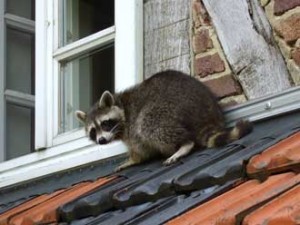
Somethin’ strange…in your neighbourhood?
By Jim Hynes
Raccoons destroying your garden, skunks living in your cabana, bats in your attic, ants in your kitchen, fungus on your tree leaves, weird worms in your lawn? Who you gonna call? Call UNIS!
McGill students Mel Lefebvre and Christie Lovat field hundreds of calls (and emails) like these every summer in a non-descript former classroom in the Raymond Building on Macdonald Campus. The two are officers at the Urban Nature Information Service (UNIS), a not-for-profit organization affiliated with McGill’s Faculty of Agricultural and Environmental Sciences providing answers to horticultural, wildlife and green-living inquiries from callers all over Quebec.
The program started as the Horticultural Information Centre back in 1982, a free service offered by the Plant Science Department. In 2001, it merged with a similar service called the Wildlife Information Centre, run by the Department of Natural Resource Sciences, to create UNIS. Today, the program is staffed by students and overseen by two coordinators: Dr. David Bird, professor of Wildlife Biology in the Department of Natural Resource Sciences, and Dr. Danielle Donnelly, a professor in the Plant Science Department.
When they can, Lefebvre and Lovat offer solutions to horticultural and wildlife dilemmas both common and unusual. They will even examine samples, of insects or damaged leaves for example, to get to the bottom of their callers’ problems.
When it comes to situations involving wild animals, however, UNIS acts as more of a referral service.
“If we are unable to help someone, like in the case of caring for an injured bird, which is illegal in Quebec without the proper permit, we can provide the numbers of organizations who can help,” says Lefebvre, who will be completing her studies in biodiversity and conservation at the McGill School of the Environment in the fall.
Every summer, UNIS staff update the list of the services they refer people to, services with names like Eco-Bug Doctor and Squirrel Rehab, to make sure the information they are providing is still accurate.
Some calls though, like the first one they received one morning in early July, can be handled with a little experience and common sense. A man in Dollard-des-Ormeaux has discovered a duck and a nest with four unhatched eggs in it near his backyard swimming pool, so Lefebvre advises him to pit the nest in a box and walk, it, slowly, to a nearby park that has a pond. Mother duck, she explains, will surely waddle behind.
Many calls to UNIS last summer, says Lovat, a Botanical Science student, were about white grubs and the animals that like to eat them ravaging suburban lawns.
“We don’t have as many white grub questions this year. A lot of our calls right now are about tree diseases. The cold spring has resulted in a lot of cold damage to trees. People are concerned that trees that were beautiful and full last year have fewer leaves and dead branches this year,” Lovat says. “In most cases we just reassure them that their tree is not dying and will come back to normal if they cut off the dead branches.”
The past two years have offered a new challenge to the UNIS officers as they got to take their know-how on the road to be shared with local municipalities and their residents. In bi-weekly visits to Terrasse-Vaudreuil, a community on the farthest reaches of the West Island, they give workshops and field questions on subjects like environmentally friendly lawn care, composting methods, white grub control, recycling, and dealing with wild animals in urban settings.
Another challenge, an ongoing one, is funding. UNIS has traditionally been funded through donations from various Quebec municipalities, a grant provided by the Federal Government, and by support from the Natural Resource Science Department. Funding cuts of any kind, UNIS says, could jeopardize the future of the service.
To reach UNIS, call 514-398-7882, email them at unis.macdonald@mcgill.ca, or visit them online at www.unis.mcgill.ca
